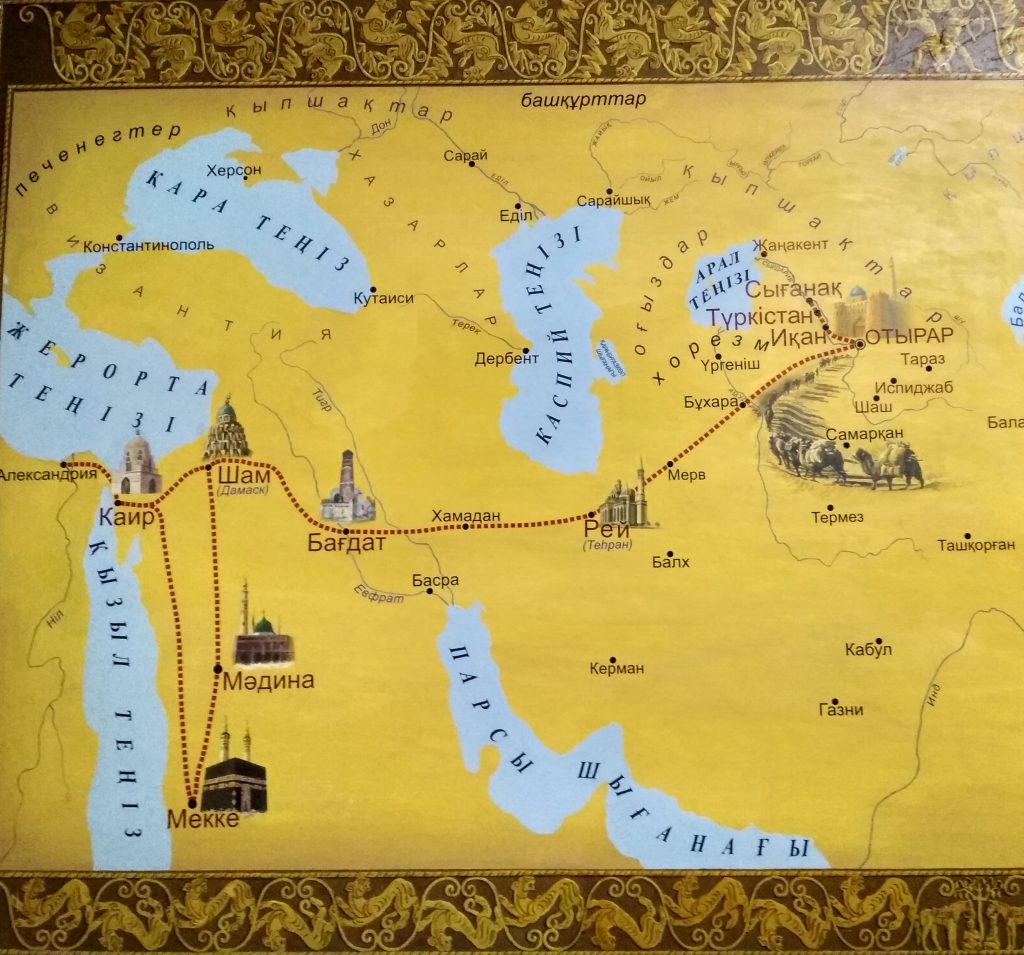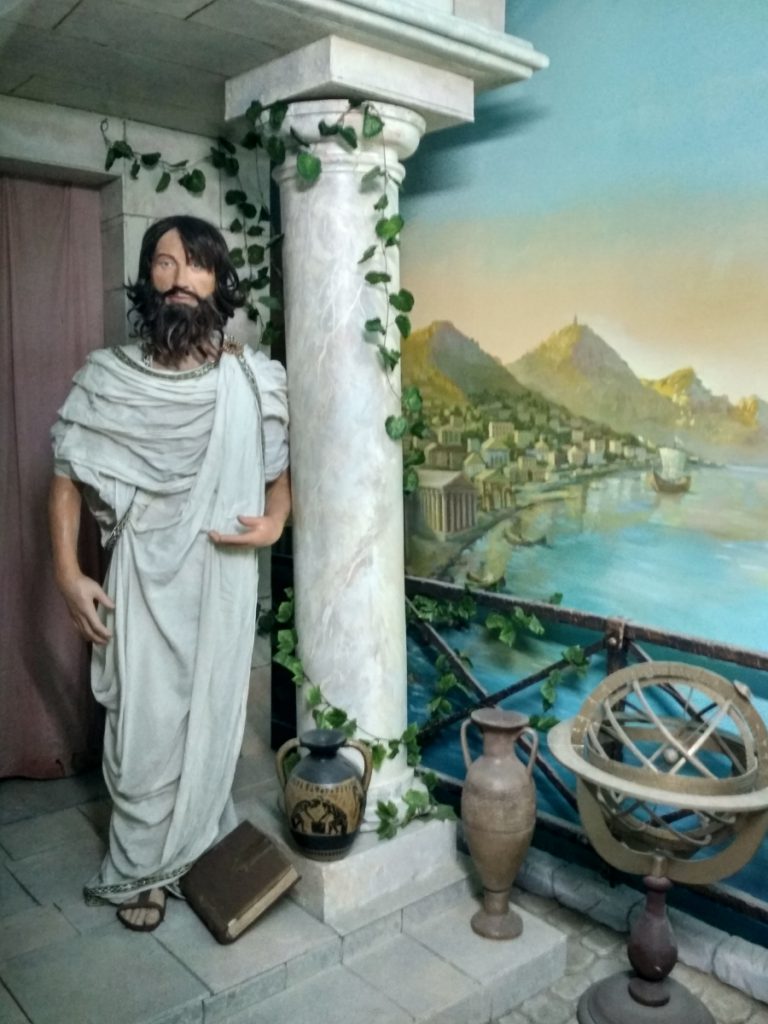AL-FARABI, HIS SPIRITUAL LEGACY AND TEACHINGS
Abu Nasyr Muhammad ibn Muhammad ibn Tarhan ibn Uzlag al-Farabi al-Turki is the full name of the thinker of the East. Al-Farabi came from a privileged class of Turks, as evidenced by the word “Tarkhan” as part of his full name.
An outstanding scientist, philosopher, mathematician, music theorist Abu Nasyr al-Farabi was born in 870 in the city of Farab, located at the confluence of the Arys river in the Syr Darya (now the Otyrar district of Turkestan region of modern Kazakhstan).
In the IX-X centuries. the city of Farab (Otyrar) was a major political, cultural and commercial center, the hub of the caravan routes of the Great Silk Road, which connected medieval Europe and Asia and attracted numerous merchants and travelers. Abu Nasyr received the basics of scientific knowledge in Farab, where he lived until the age of 20, here he had the opportunity to get acquainted with the philosophical and scientific works of the Otrar library, which was considered the richest at that time and the second in the world in the number of books and manuscripts after the famous Alexandria libraries. Growing up, he visited Bukhara, Samarkand, Shasha (Tashkent), where he studied and worked for some time.
To continue his education, Abu Nasyr goes to Baghdad, which was the cultural and political center of the Arab Caliphate. It was here that the famous school of translators worked. They translated and commented on the works of Plato, Aristotle, Galen, Euclid. Mentors of Abu Nasyr in Baghdad were Juhanna ibn Hailan and the famous translator of ancient texts in Arabic Abu Bishr Matta. The scientist al-Farabi mastered dozens of languages, dialects and dialects, to perfection – Turkic, Arabic, Greek, Persian languages, as evidenced by his work.
Al-Farabi had the opportunity to get acquainted in the scripts with the works of Aristotle, Plato and other ancient Greek philosophers. In 941, al-Farabi, who had become a famous scientist by this time, moved to Damascus, where he spent the rest of his life doing scientific work.

Abu Nasyr al-Farabi is the author of comments on the works of Aristotle (in connection with which he was nicknamed the “Second Teacher”) and Plato. Al-Farabi wrote comments on such works of Aristotle as “Category”, “Hermeneutics”, “Sophistry”, “Rhetoric”, “Logic” and “Poetics”, as well as “Introduction to Philosophy” by Porfiry and other thinkers. Of the original works of Farabi, the most famous are the pearls “Pearls of Wisdom,” “A Treatise on the Views of the Residents of a Virtuous City,” “Philosophical Treatises” and “The Big Book of Music”.
In Europe already in the XII-XIII centuries. Al-Farabi’s writings began to be translated into Latin and Hebrew. In 1930-1932 In Paris, a French translation of the first part of the Great Book of Music, published by French scholar Baron Rudolph d’Herlange, was published.

The name al-Farabi has firmly entered the history of world science and culture. His works, having a great influence on the European Renaissance, became a connecting bridge for the rapprochement of cultures and philosophies of the West and the East.
In Kazakhstan, questions of studying the heritage of al-Farabi were addressed in the second half of the twentieth century. So, in October 15, 1960, Kalym Akzhan Mashanov (Mashani) wrote a letter to the president of the Academy of Sciences of the Kazakh SSR, academician K.I. Satpayev with a request to support the idea of a study by scientists of the country of the heritage of al-Farabi and the translation of his works, noting that “The Great Al-Farabi is our fellow countryman, and we know little about him …”. Significant contribution to Farabi studies was made by such scientists as a philosopher, corresponding member of the National Academy of Sciences of the Republic of Kazakhstan, the founder of the Al-Farabi Scientific Center in KazNU A.Kh. Kasymzhanov; the well-known mathematician who spoke Arabic and defended his doctoral dissertation in mathematics al-Farabi A. Kobesov; Academician, philosopher M. Burabaev; famous Kazakh writer A. Alimzhanov. A significant event was the international conference on the heritage of al-Farabi, held simultaneously in Almaty, Moscow and Baghdad with the support of UNESCO and the Government of the Kazakh SSR, organized by Akzhan Mashani and Agyn Kasymzhanov in 1970 on the occasion of the 1100th anniversary of al-Farabi.
On January 29, 2020, the official opening ceremony of the anniversary year – the year of the 1150th anniversary of Abu Nasyr al-Farabi, was held at Al-Farabi Kazakh National University. The opening ceremony of the anniversary year of al-Farabi was attended by the Secretary of State of the Republic of Kazakhstan, K. Kusherbayev, representatives of the UN and UNESCO, the OIC, diplomatic missions in Kazakhstan, government and public figures, university rectors, heads of scientific centers and research institutes, famous foreign and domestic scientists, teachers and students (https://elibrary.kaznu.kz/en/node/5).
TEACHINGS:
- To be educated means to be capable of discovering something new.
- True knowledge is the truth itself — clear and certain understanding.
- The thoughts of a person seeking knowledge lie far beyond everyday concerns.
- To appropriate another’s opinion is an act befitting an ignorant and ill-intentioned person.
- Education is the cultivation in a person of ethical values and artistic sensibility founded on knowledge.
- The teacher’s conduct should be balanced: neither too strict nor too lenient. Excessive severity turns the student against the teacher, while excessive indulgence diminishes respect, causing the student to become indifferent to the knowledge and science being taught.
- A person attains their goal through self-improvement.
- Fidelity to one’s conscience depends on one’s own dignity and virtuous deeds.
- Truthfulness is akin to honesty.
- One who strives for virtuous deeds rises upward; choose a loyal friend among your equals.
- A flaw in character is a spiritual ailment.
- Character is the mirror of the soul.
- The stability of happiness depends on the goodness of one’s character.
- When intellect and virtue harmonize, humanity triumphs.
- A person who desires qualities they do not possess is hypocritical.
- Carelessness leads to failure.
- Many disguise self-interest under the name of friendship — beware of being deceived one day.
- Beautiful melody refreshes the soul.
- Music is the work of the spirit, of passion, desire, and the many states of the human heart.
- The primary purpose of music is to satisfy a person’s aesthetic needs.
- One of the finest human traits is the ability to perceive the beauty of the surrounding world, to draw spiritual nourishment from it, and to express delicate feelings through imagery.
- When the body suffers, the soul suffers as well.
- Only what is sincerely cherished reaches the heart.
- If you look at the world through the eyes of wisdom, the world is wondrous and you are its key; if you look through the eyes of ignorance, the world is but trash and you are its owner.
